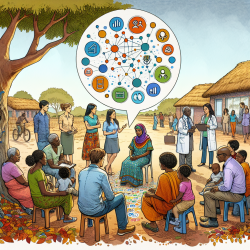Introduction
As practitioners dedicated to improving the lives of children, understanding the complex interplay of factors that influence developmental trajectories is crucial. The research article "Linking Childhood and Adult Criminality: Using a Life Course Framework to Examine Childhood Abuse and Neglect, Substance Use and Adult Partner Violence" provides valuable insights into how early life experiences can shape adult outcomes. This blog explores how practitioners can leverage the life course framework to enhance their practice and create better outcomes for children.
The Life Course Framework
The life course framework is a comprehensive approach that considers the social, economic, and environmental determinants of well-being throughout a person's life. It emphasizes the importance of understanding pathways and trajectories as an integrated continuum of exposures, experiences, and interactions. By using this framework, practitioners can better understand the cumulative effects of early life exposures on adult criminality and identify modifiable contextual influences.
Key Findings from the Research
The research highlights several critical findings:
- Childhood abuse and neglect are significant predictors of adult criminality, including substance use and intimate partner violence.
- Intergenerational patterns of abuse and neglect can perpetuate cycles of violence and criminality.
- The life course framework provides a useful lens for examining the cumulative impacts of early adverse conditions and identifying key turning points that can alter life trajectories.
Implications for Practitioners
Practitioners can use the insights from this research to inform their practice in several ways:
- Early Intervention: Identifying children at risk of abuse and neglect early can help prevent the development of criminal behaviors. Implementing evidence-based interventions that focus on building resilience and strengthening family support systems is crucial.
- Understanding Contextual Factors: Practitioners should consider the broader social and environmental context when assessing and intervening with families. Factors such as poverty, housing instability, and parental substance use can exacerbate the risk of criminality.
- Breaking the Cycle: By addressing intergenerational patterns of abuse and neglect, practitioners can help break the cycle of violence. Providing support and resources to parents who have experienced childhood abuse can prevent the transmission of these behaviors to the next generation.
Encouraging Further Research
While the life course framework offers valuable insights, further research is needed to deepen our understanding of the complex factors influencing criminality. Practitioners are encouraged to engage in ongoing research and collaboration to develop innovative strategies for prevention and intervention.
To read the original research paper, please follow this link: Linking Childhood and Adult Criminality: Using a Life Course Framework to Examine Childhood Abuse and Neglect, Substance Use and Adult Partner Violence.










